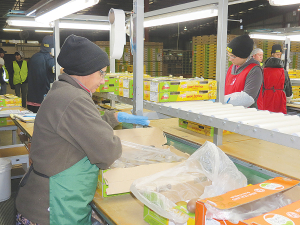Two new awards open to help young farmers progress to farm ownership
Entries have opened for two awards in the New Zealand Dairy Industry Awards (NZDIA) programme, aimed at helping young farmers progress to farm ownership.
 Trevelyans says one of its goals is to reduce its waste to landfill by 10% per year, with a further intention of sending zero waste to landfill by 2030.
Trevelyans says one of its goals is to reduce its waste to landfill by 10% per year, with a further intention of sending zero waste to landfill by 2030.
The country’s largest family owned and single-site kiwifruit and avocado post-harvest service provider has signed up to a sustainability linked loan (SLL) with ASB.
Trevelyan’s has taken on a SLL, which requires it to commit to key environmental, social and/or governance (ESG) targets, with borrowing costs adjusted based on its performance against these targets.
The company says it has committed to three key areas of focus – reductions in both waste and carbon emissions and improved wellness metrics for its workforce.
Managing director James Trevelyan says the focus on waste, carbon emissions and wellness feeds back to Trevelyan’s sustainability framework of three key pillars – to work smart, tread lightly and treat their people with respect. “We are fully aware that sustainable practices are a longterm investment and will drive ethical and financial value for our business, our people and the planet. We are delighted to partner with ASB with this shared vision.”
He says one of the company’s goals is to reduce its waste to landfill by 10% per year, with a further intention of sending zero waste to landfill by 2030.
ASB head of sustainable finance James Paterson says it’s encouraging to see businesses increasingly focused on sustainability.
“The work from Trevelyan’s with this new SLL is a credit to them and their desire to grow a better future and tread lightly as they do so. We are proud to help bring this to life.”
Patterson says ASB is progressing well on its mission to support industry transition. The bank has a cumulative sustainable lending target of $6.5 billion by 2030 for green, social and sustainability- linked lending across the rural, property, corporate and business sectors – with around $810 million committed to date.
Coming in at a year-end total at 3088 units, a rise of around 10% over the 2806 total for 2024, the signs are that the New Zealand farm machinery industry is turning the corner after a difficult couple of years.
New Zealand's animal health industry has a new tool addressing a long-standing sustainability issue.
The Government has announced that ACC will be a sponsor of this year's FMG Young Farmer of the Year competition.
As veterinary student numbers grow to help address New Zealand's national workforce shortge, Massey University's School of Veterinary Science is inviting more veterinary practices to partner in training the next generation of vets.
South Island dairy farmers will soon be able to supply organic milk to Fonterra.
Norwood has announced the opening of a new Tasman dealership at Richmond near Nelson next month.